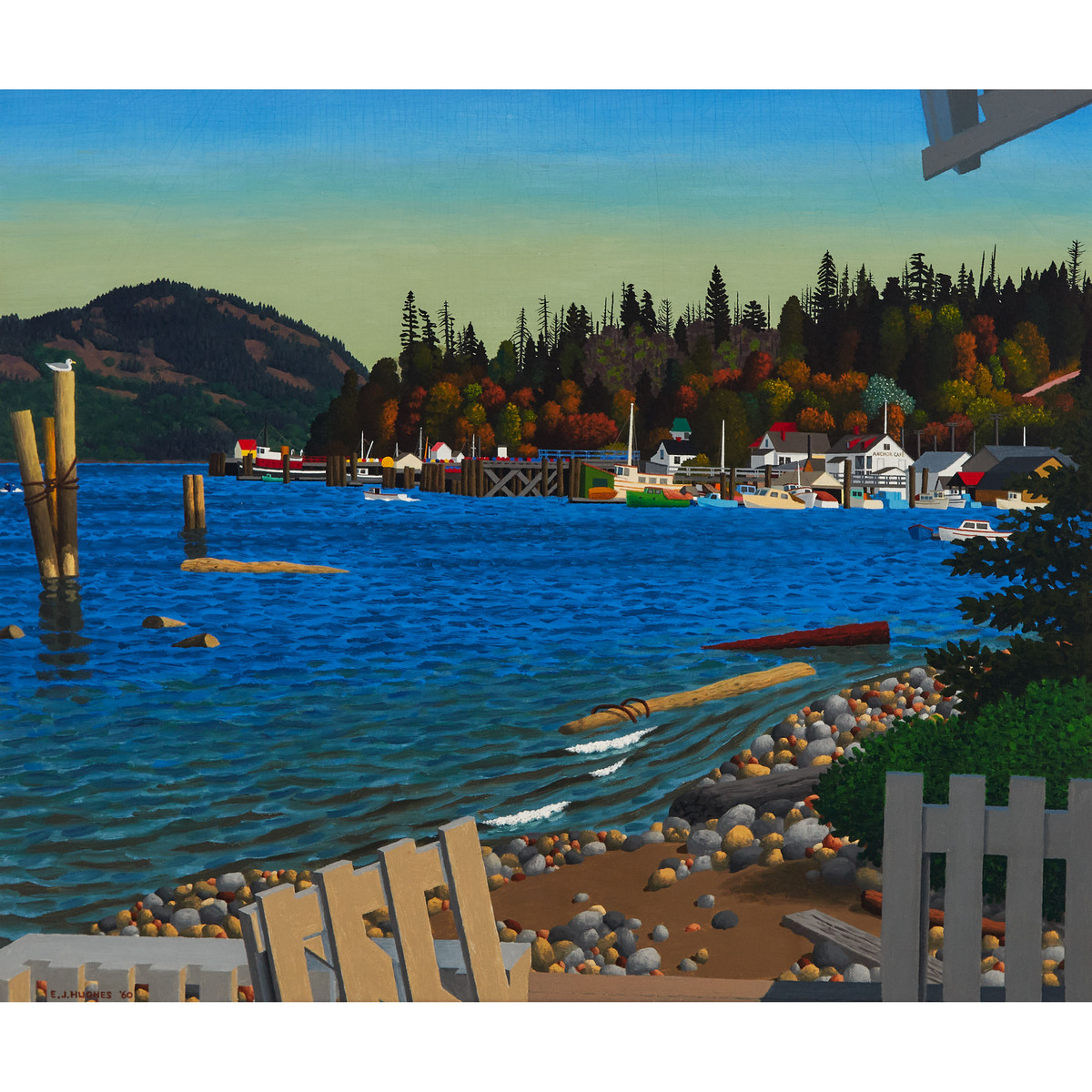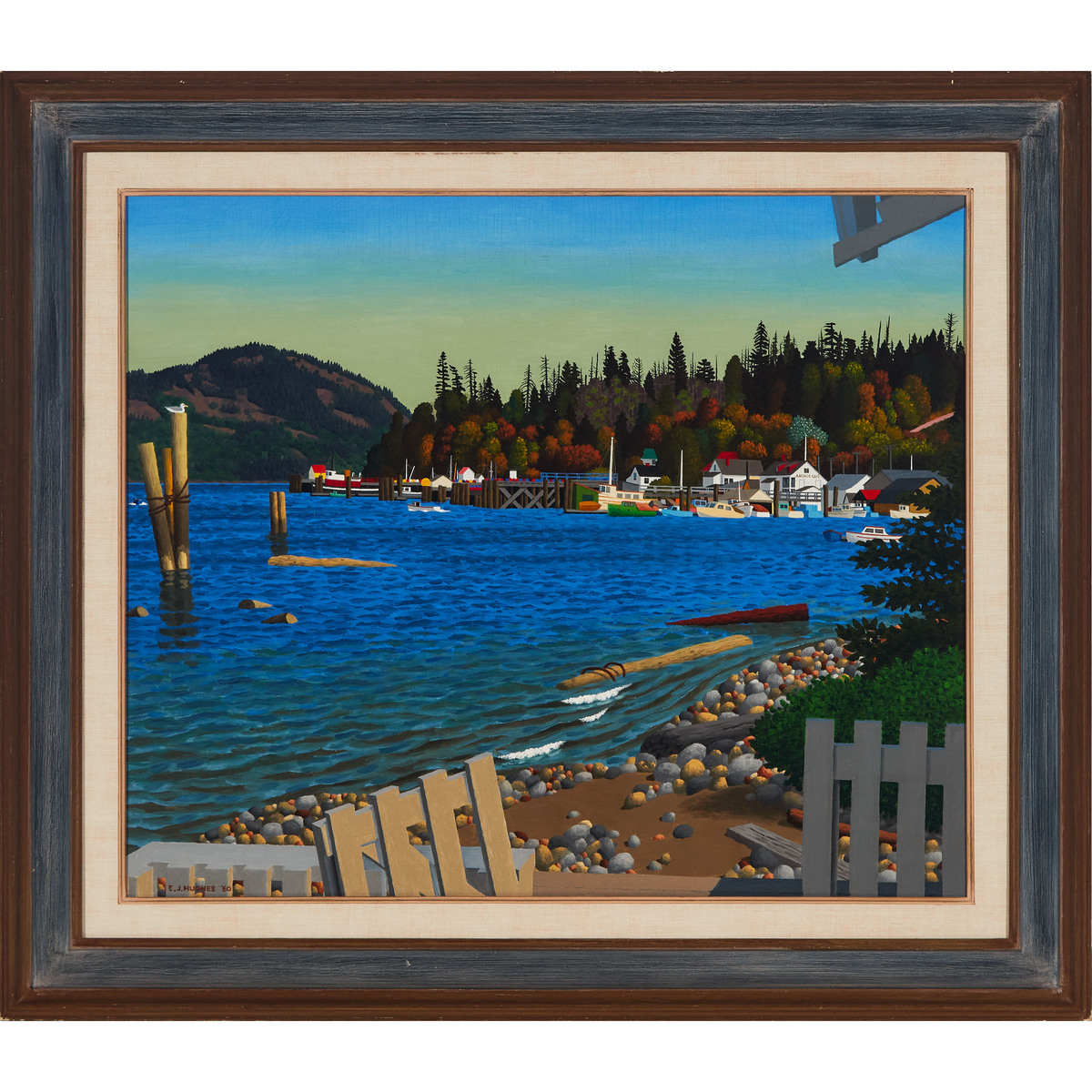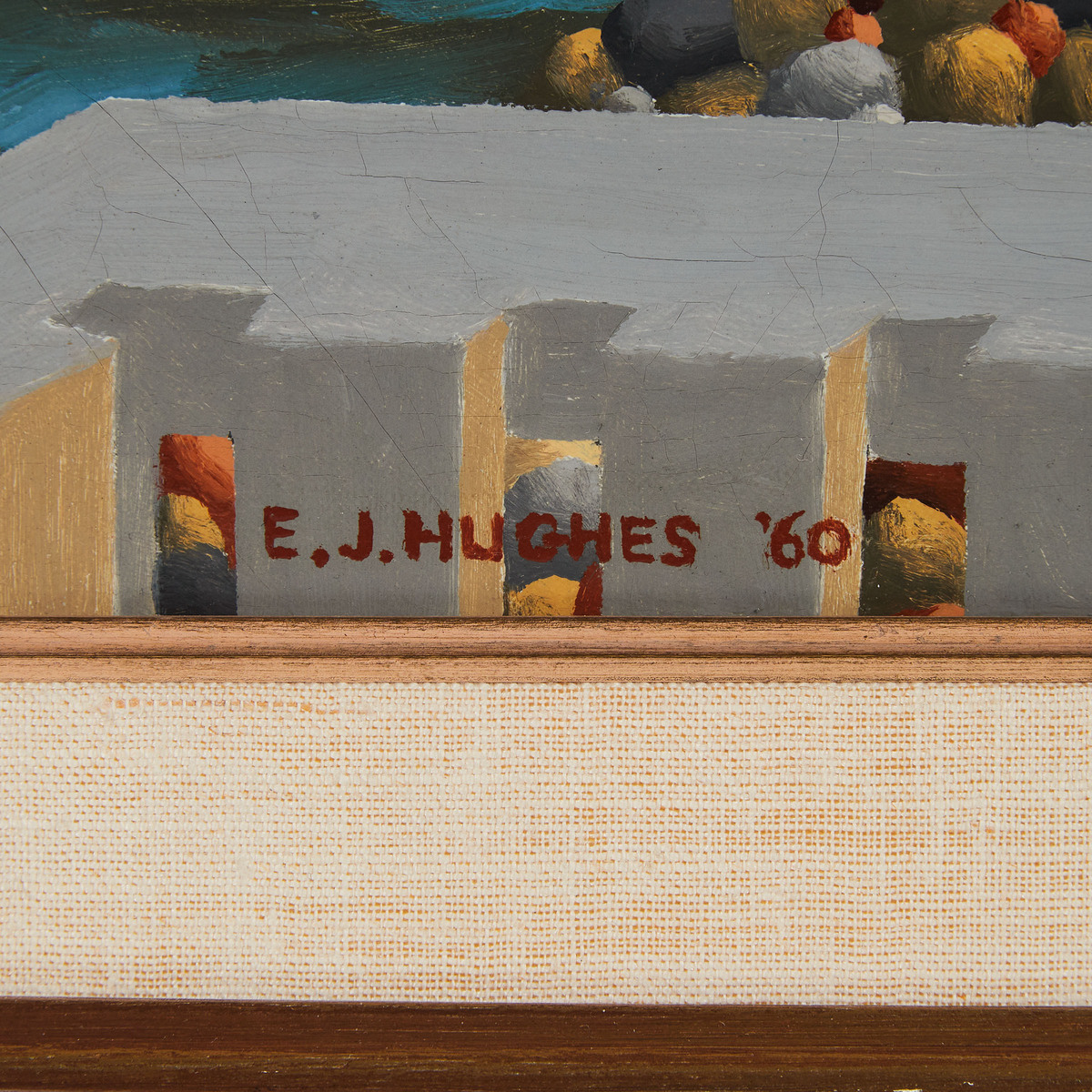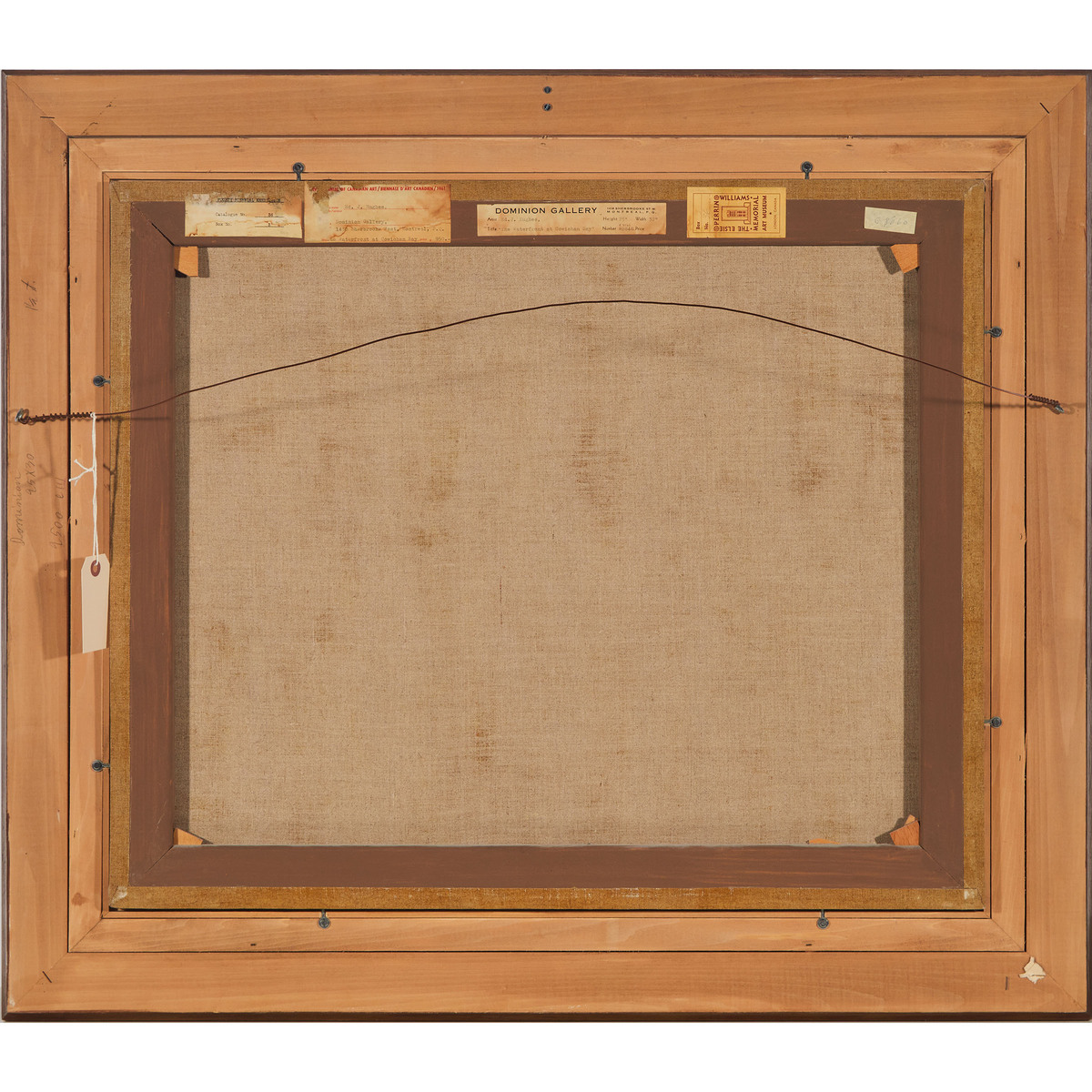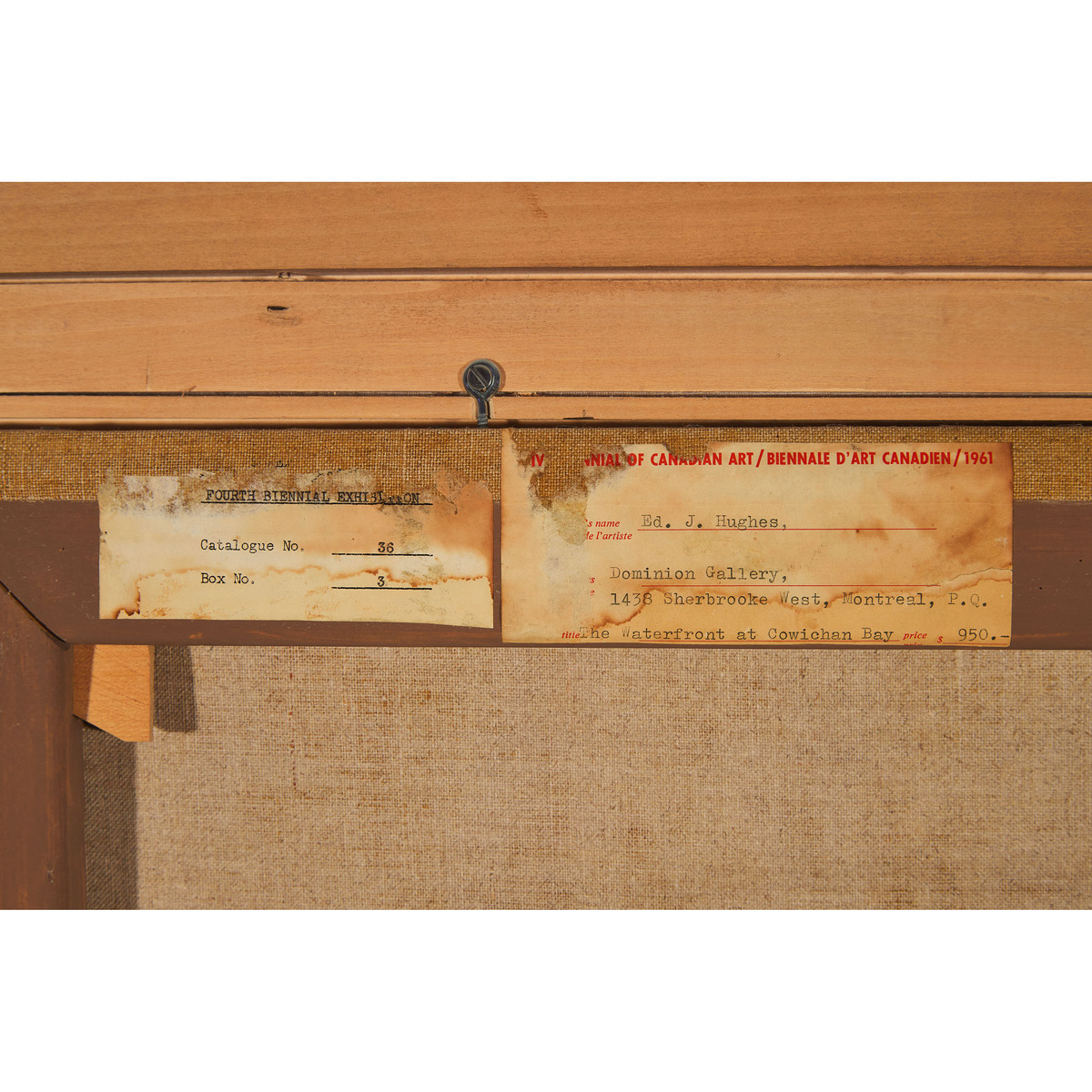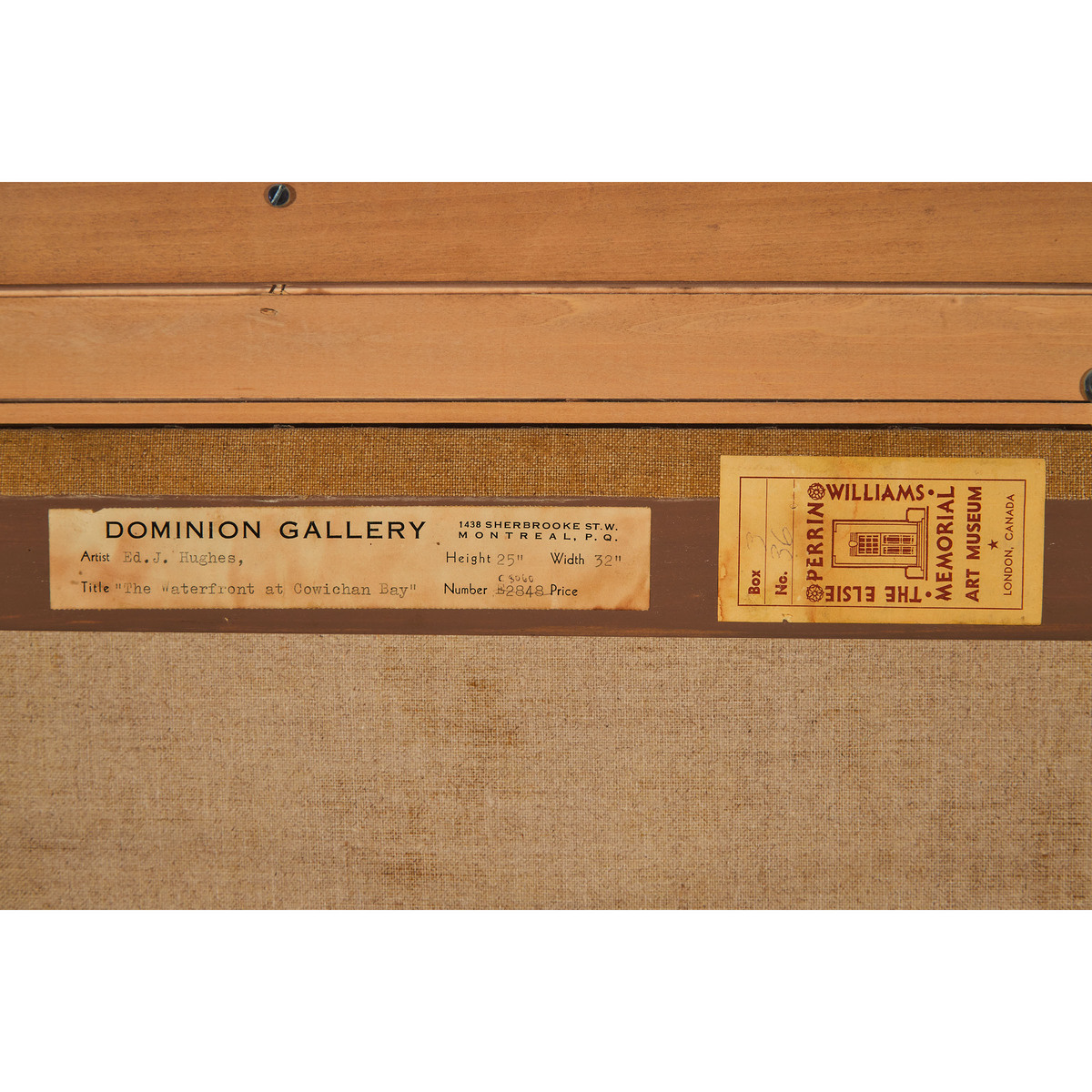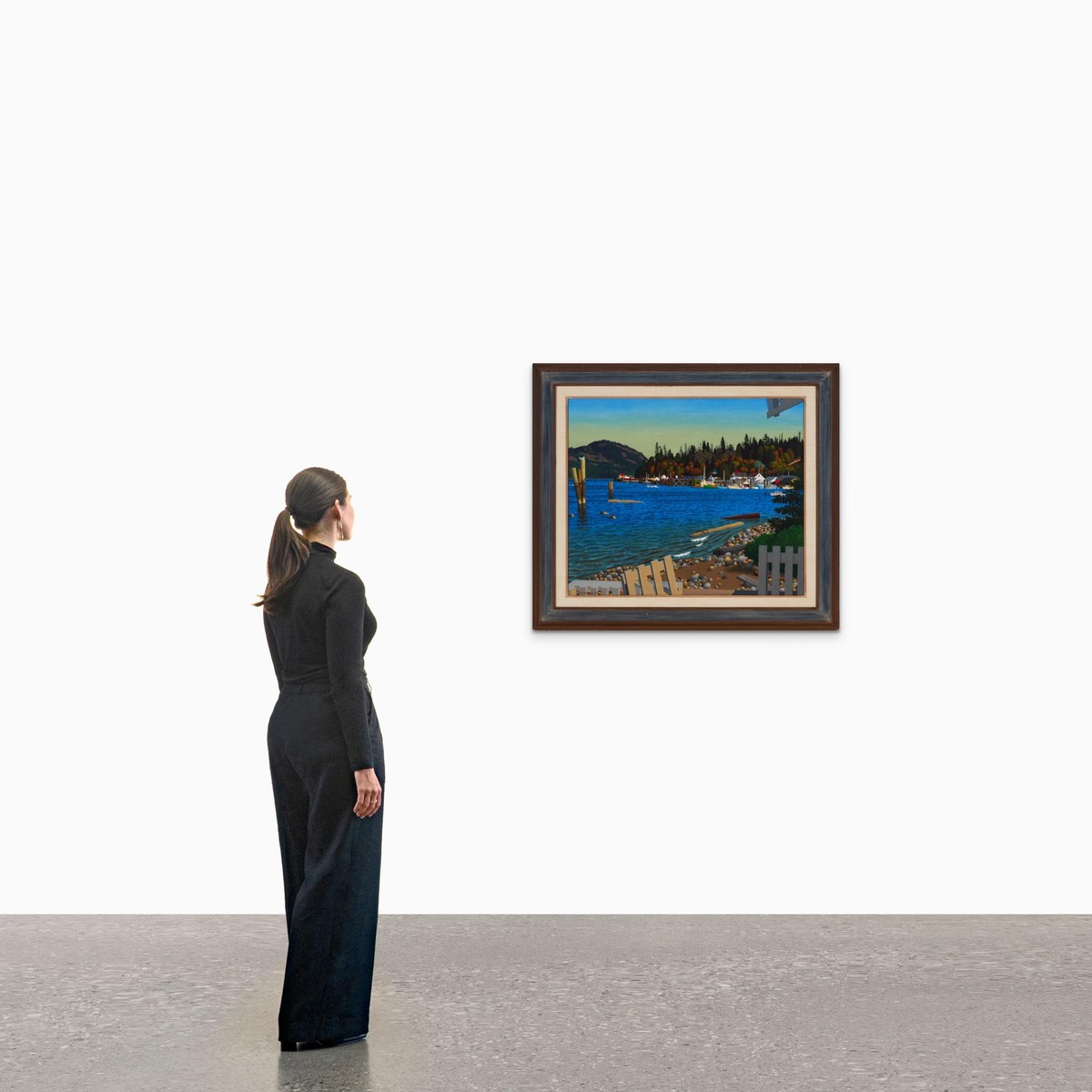25
Edward John (E.J.) Hughes, RCA (1913-2007), THE WATERFRONT AT COWICHAN BAY, 1960, oil on linen, 25 x
THE WATERFRONT AT COWICHAN BAY, 1960
oil on linen
signed and dated "60"; titled to gallery label verso
25 x 30 in — 63.5 x 81.3 cm
Provenance:
Dominion Gallery, Montreal, QC;
Private Collection, Montreal, QC / Haarlem, The Netherlands;
By descent to Private Collection, London, UK;
By descent to Private Collection, Burlington, ON
Exhibited:
The Fourth Biennial of Canadian Art 1961. National Gallery of Canada, Ottawa, ON, 19 May-3 Sep 1961.
The New Brunswick Art Museum, Saint John, NB, 28 Sep-8 Oct 1961.
L'école des beaux-arts de Montréal, Montreal, QC, 27 Oct-11 Nov 1961.
The Public Library and Art Museum, London, ON, 25 Nov-24 Dec 1961.
Norman Mackenzie Art Gallery, Regina College, Regina, SK, 5-26 Jan 1962. Edmonton Art Gallery, Edmonton, AB, 5-27 Feb 1962.
Art Gallery of Greater Victoria, Victoria, BC, 8-29 Mar 1962.
University of British Columbia, Vancouver, BC, 11-28 Apr 1962.
The Fourth Biennial of Canadian Art, Calgary, AB [venue unknown], 19 May-8 June 1962, no. 36.
Literature:
The Fourth Biennial Exhibition of Canadian Art 1961 (exh. cat.) (Ottawa: National Gallery of Canada, 1961), unpaged, no. 36, repro. b/w.
Florian, “One Last Look At 4th Biennial,” The Ottawa Journal (Ottawa, ON), 2 Sep 1961, 35.
Jacques Barbeau, The E.J. Hughes Album: The Paintings, Volume I, 1932-1991 (Vancouver: The E.J. Hughes Catalogue Committee, 2011), 35, repro. col.
Note:
After serving as an official war artist from 1939-1946, Hughes returned to the west coast of Canada, settling on Vancouver Island. Knowingly or not, he would begin a lifelong study of the British Columbia landscape. Hughes is often seen as the heir to Emily Carr, and indeed the two artists have been linked for decades. Hughes won the inaugural Emily Carr Scholarship on the recommendation of Group of Seven member Lawren Harris, and was once described by Canadian artist Jack Shadbolt as “the most engaging intuitive painter of the B.C. landscape since Emily Carr.” It is fitting that both have a painting included in this auction—for Carr’s work, please see lot 16.
Cowichan Bay is located in the Cowichan Valley, a region known for having the warmest year-round temperatures in Canada, as well as a thriving artistic, athletic, and culinary scene. The area was well known to First Nations people for its wealth of natural resources like salmon and shellfish—by the 1900s it was known as the salmon capital of the world. Hughes loved painting the area, and later in his career noted: “I have painted in the Cowichan Valley for fifty years and it is the most beautiful place on earth.”
Hughes was known to make meticulous preparatory sketches on site before beginning a painting in his studio. It is interesting to consider how this particular composition was painted so as to give the impression of great spontaneity and nonchalance, as evidenced by the stray gable poking into the composition on the top right corner. Coupled with the tilted fences in the foreground, the painting suggests that the viewer is actively entering the scene, moving into rather than sitting outside of it. Most painters, after careful consideration, will edit out the “imperfect” elements of a composition, seeking to present the viewer with the more perfect “wish-you-were-here” view. Here, in allowing these subtle interruptions to enter the scene, Hughes builds in veracity—and the effect is that the viewer feels extraordinarily present.
Estimate: $150,000—250,000
THE WATERFRONT AT COWICHAN BAY, 1960
oil on linen
signed and dated "60"; titled to gallery label verso
25 x 30 in — 63.5 x 81.3 cm
Provenance:
Dominion Gallery, Montreal, QC;
Private Collection, Montreal, QC / Haarlem, The Netherlands;
By descent to Private Collection, London, UK;
By descent to Private Collection, Burlington, ON
Exhibited:
The Fourth Biennial of Canadian Art 1961. National Gallery of Canada, Ottawa, ON, 19 May-3 Sep 1961.
The New Brunswick Art Museum, Saint John, NB, 28 Sep-8 Oct 1961.
L'école des beaux-arts de Montréal, Montreal, QC, 27 Oct-11 Nov 1961.
The Public Library and Art Museum, London, ON, 25 Nov-24 Dec 1961.
Norman Mackenzie Art Gallery, Regina College, Regina, SK, 5-26 Jan 1962. Edmonton Art Gallery, Edmonton, AB, 5-27 Feb 1962.
Art Gallery of Greater Victoria, Victoria, BC, 8-29 Mar 1962.
University of British Columbia, Vancouver, BC, 11-28 Apr 1962.
The Fourth Biennial of Canadian Art, Calgary, AB [venue unknown], 19 May-8 June 1962, no. 36.
Literature:
The Fourth Biennial Exhibition of Canadian Art 1961 (exh. cat.) (Ottawa: National Gallery of Canada, 1961), unpaged, no. 36, repro. b/w.
Florian, “One Last Look At 4th Biennial,” The Ottawa Journal (Ottawa, ON), 2 Sep 1961, 35.
Jacques Barbeau, The E.J. Hughes Album: The Paintings, Volume I, 1932-1991 (Vancouver: The E.J. Hughes Catalogue Committee, 2011), 35, repro. col.
Note:
After serving as an official war artist from 1939-1946, Hughes returned to the west coast of Canada, settling on Vancouver Island. Knowingly or not, he would begin a lifelong study of the British Columbia landscape. Hughes is often seen as the heir to Emily Carr, and indeed the two artists have been linked for decades. Hughes won the inaugural Emily Carr Scholarship on the recommendation of Group of Seven member Lawren Harris, and was once described by Canadian artist Jack Shadbolt as “the most engaging intuitive painter of the B.C. landscape since Emily Carr.” It is fitting that both have a painting included in this auction—for Carr’s work, please see lot 16.
Cowichan Bay is located in the Cowichan Valley, a region known for having the warmest year-round temperatures in Canada, as well as a thriving artistic, athletic, and culinary scene. The area was well known to First Nations people for its wealth of natural resources like salmon and shellfish—by the 1900s it was known as the salmon capital of the world. Hughes loved painting the area, and later in his career noted: “I have painted in the Cowichan Valley for fifty years and it is the most beautiful place on earth.”
Hughes was known to make meticulous preparatory sketches on site before beginning a painting in his studio. It is interesting to consider how this particular composition was painted so as to give the impression of great spontaneity and nonchalance, as evidenced by the stray gable poking into the composition on the top right corner. Coupled with the tilted fences in the foreground, the painting suggests that the viewer is actively entering the scene, moving into rather than sitting outside of it. Most painters, after careful consideration, will edit out the “imperfect” elements of a composition, seeking to present the viewer with the more perfect “wish-you-were-here” view. Here, in allowing these subtle interruptions to enter the scene, Hughes builds in veracity—and the effect is that the viewer feels extraordinarily present.
Estimate: $150,000—250,000
Canadian, International, and Inuit Art
Ends from
Venue Address
For Waddington's delivery information please telephone +1 4165049100.
Important Information
Bidding for this sale will take place entirely online on Waddingtons Online Auction Platform
Waddington’s charges a buyer’s premium of 23% on the hammer price up to and including $25,000 CAD. Hammer prices in excess of $25,000 CAD will be charged a buyer’s premium of 20%. Payment for purchases is accepted in Canadian dollars by cash, certified cheque drawn on a Canadian bank, travelers cheque, bank draft or transfer, Visa or Mastercard within 10 days from the date of the sale.
Terms & Conditions
Terms and conditions:
1. All lots are sold “AS IS”. Any description issued by the auctioneer of an article to be sold is subject to variation to be posted or announced verbally in the auction room prior to the time of sale. While the auctioneer has endeavoured not to mislead in the description issued, and the utmost care is taken to ensure the correct cataloguing of each item, such descriptions are purely statements of opinion and are not intended to constitute a representation to the prospective purchasers and no warranty of the correctness of such description is made. An opportunity for inspection of each article is offered prior to the time of sale. No sale will be set aside on account of lack of correspondence of the article with its description or its reproduction, if any, whether colour or black & white. Some lots are of an age and/or nature which preclude their being in pristine condition and some catalogue descriptions make reference to damage and/or restoration. The lack of such a reference does not imply that a lot is free from defects nor does any reference to certain defects imply the absence of others. Frames on artwork are not included as part of purchase or condition. It is the responsibility of prospective purchasers to inspect or have inspected each lot upon which they wish to bid, relying upon their own advisers, and to bid accordingly.
2. Each lot sold is subject to a premium as part of the purchase price as per below:
Live and Online Auctions
(excluding Canadian Fine Art, Inuit Art, The Art of Canada and Fine Wine & Spirits Auctions)















